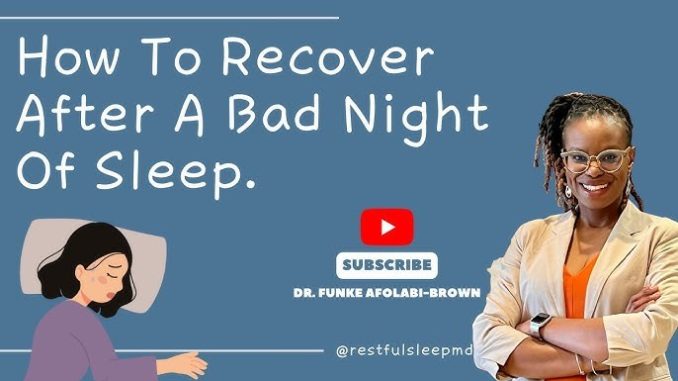
Sleepless nights happen to everyone at some point, whether caused by stress, travel, deadlines, or unexpected interruptions. While one poor night of rest may not seem catastrophic, its effects ripple across the next day in ways that are hard to ignore. Fatigue, irritability, difficulty concentrating, and slower reaction times can all emerge, making even simple tasks feel heavier than usual. For professionals, this can mean reduced productivity, poor decision-making, and an increased risk of mistakes. The challenge then becomes less about avoiding sleepless nights altogether—which is not always possible—and more about learning how to recover effectively so the body and mind can reset and move forward.
The first step in recovering from a sleepless night is acknowledging the reality of reduced capacity. Many people attempt to power through as if nothing happened, expecting the same level of performance despite obvious fatigue. This approach often backfires, leading to frustration and compounding stress. Instead, it helps to adjust expectations for the day ahead, prioritizing essential tasks and allowing less critical work to wait. In the same way that businesses triage during periods of limited resources, individuals can triage energy, focusing on what truly matters and letting the rest go until balance is restored.
Hydration and nutrition play a key role in helping the body bounce back. A sleepless night can leave the body slightly dehydrated and craving quick sources of energy. While it is tempting to reach for sugary snacks or excessive caffeine, these choices often lead to spikes and crashes that worsen fatigue. A steadier approach involves drinking plenty of water and choosing balanced meals that include protein, healthy fats, and complex carbohydrates. These foods provide sustained energy and reduce the rollercoaster effect that amplifies exhaustion. Caffeine, if used, should be consumed strategically—early in the day and in moderate amounts—so it sharpens alertness without interfering with the next night’s sleep.
Movement also helps recalibrate the body after little rest. While intense exercise may feel overwhelming when tired, light activity such as walking, stretching, or yoga stimulates circulation, boosts mood, and improves focus. These forms of movement also help reset circadian rhythms, especially when combined with exposure to natural light. Spending time outdoors signals to the body that it is daytime, anchoring the internal clock and increasing the likelihood of falling asleep more easily the following night. In this way, movement becomes less about burning calories or building strength and more about gently nudging the body back into rhythm.
Short, intentional rest periods can also provide relief. A brief nap of 15 to 20 minutes can improve alertness without causing grogginess or interfering with nighttime sleep. Longer naps, however, may push the body into deeper sleep stages and leave you feeling even more sluggish afterward. If napping is not an option, simply closing your eyes for a few minutes or practicing deep breathing can offer restorative benefits. These micro-breaks act as a buffer, preventing the downward spiral of exhaustion from completely taking over the day. Much like businesses use short pauses to recalibrate strategy, the body benefits from small resets that prevent burnout.
Just as important as navigating the day after a sleepless night is preparing for the next night’s recovery. The goal is to avoid turning one rough night into an ongoing cycle of disrupted sleep. Creating a calming routine in the evening—dimming lights, reducing screen exposure, and engaging in relaxing activities—helps signal to the body that it is time to wind down. Avoiding excessive caffeine or alcohol late in the day further improves the chances of a restful night. Consistency matters here; returning to regular sleep and wake times reinforces the body’s natural rhythms, making it easier to catch up and stabilize quickly.
There is also a mental aspect to recovering from sleeplessness. Often, people become anxious about the fact that they did not sleep, worrying about how it will affect the next day. This worry compounds stress, making it even harder to rest the following night. Shifting the perspective from frustration to self-compassion helps break the cycle. Sleepless nights are a normal part of life, and the body is remarkably resilient in bouncing back when given the chance. By taking care of hydration, nutrition, movement, and rest, most people can return to their baseline after one or two nights of adjustment.
In professional settings, transparency can sometimes help as well. Acknowledging fatigue to colleagues or adjusting workloads for the day prevents overextension and reduces the risk of mistakes. Just as leaders manage resources realistically during times of constraint, individuals can manage their own energy by being honest about capacity. This approach not only supports recovery but also fosters healthier workplace cultures where rest and well-being are recognized as vital to performance.
Ultimately, recovering from sleepless nights is about creating the conditions for the body to reset rather than forcing it to perform at full capacity immediately. Adjusting expectations, supporting the body with hydration and balanced nutrition, incorporating gentle movement, and prioritizing consistent sleep routines all help restore balance. For professionals, the key takeaway is that recovery is not wasted time but an investment in future productivity and resilience. By treating sleepless nights as temporary setbacks rather than insurmountable obstacles, you give yourself the space to recover fully and return stronger the next day.
Would you like me to also prepare a shorter 400–500 word version of this article that could be used as a quick wellness insight for newsletters or LinkedIn?